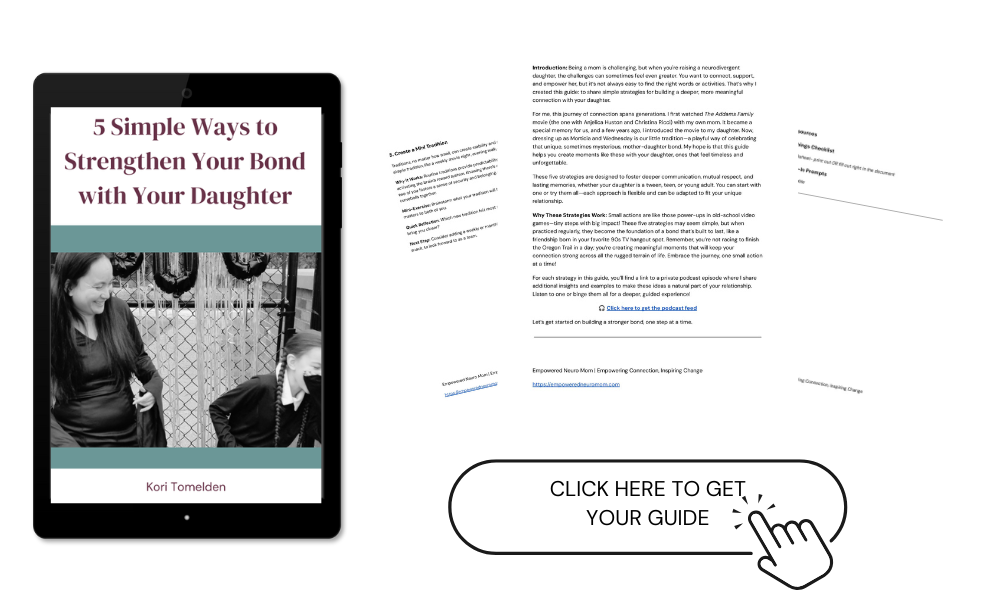As neurodivergent moms, we navigate unique challenges every day. These experiences often demand us to reframe not only how we approach parenting but also how we see ourselves. Certain beliefs—rooted in societal norms or personal expectations—can create unnecessary barriers, leaving us feeling inadequate or overwhelmed. But here’s the good news: recognizing and shifting these beliefs can unlock resilience, confidence, and joy.
Let’s explore five common beliefs that may be holding you back and how to reframe them to empower yourself and your family.
Belief 1: “I need to do it all to be a good mom.”
Shift: Embrace the idea that “good enough” truly is enough.
Supermom culture is a trap, often leading to burnout rather than fulfillment. Parenting isn’t about doing it all; it’s about being present in the moments that matter.
I remember one morning when I had a mile-long to-do list and the growing pressure to be everything for everyone. Instead of powering through, I chose to pause. My daughter and I sat on the couch, each with a cup of hot cocoa, and talked about our favorite Disney characters. That small connection—five minutes of genuine presence—meant more to her than anything else I could have done that day. That’s the power of “good enough.”
Think of this shift as packing light for your parenting journey. Prioritize the essentials, like connection and self-care, and let go of the things that weigh you down.
Belief 2: “If my child struggles, it’s because I’m failing.”
Shift: See struggles as part of growth, not a reflection of your parenting.
When my daughter was learning to navigate her emotions, there were times when her meltdowns felt like my failure. I questioned everything—my patience, my strategies, my worth as a mom. Then one day, in the middle of a particularly challenging moment, I realized that her meltdown wasn’t about me. It was her way of processing something overwhelming, and my job was simply to be her calm in the storm.
By shifting this belief, I learned to see her struggles as stepping stones. Each time we weathered the storm together, her resilience grew—and so did mine. When we view challenges as natural parts of growth, we give ourselves and our children the grace to learn and adapt.
Belief 3: “I have to hide my own neurodivergent traits to be a good role model.”
Shift: Authenticity is your superpower.
For years, I thought I had to mask my ADHD traits to be a “proper” mom. But masking left me drained and disconnected. One day, I decided to let my guard down. I shared with my daughter how I use sticky notes everywhere to keep track of my thoughts and how I sometimes need a “reset” when I feel overstimulated. Her response floored me: “Me too, Mom! Maybe we can do resets together!”
That moment reminded me that being authentic isn’t just okay—it’s necessary. By showing my daughter how I navigate life as a neurodivergent individual, I modeled self-acceptance and gave her permission to do the same. As Stitch said, “Ohana means family, and family means nobody gets left behind or forgotten”—and that includes your quirks and strengths.
Belief 4: “Traditional advice should work, and if it doesn’t, I’m doing something wrong.”
Shift: Redefine success based on what works for your unique family.
I’ll never forget the day I tried to implement a rigid bedtime routine because “all the experts” swore by it. Spoiler alert: it was a disaster. The rigidity triggered my daughter’s anxiety, and we both ended up in tears. That’s when I realized traditional advice wasn’t designed for us.
So, we scrapped the bedtime battle and embraced flexibility. Some nights, we read three books; other nights, we sing a song and talk about our “Trail Wins” of the day—those small victories that make us proud. Success looks different for every family, and that’s okay. The key is to trust yourself and create a rhythm that feels right for you.
Belief 5: “My child’s neurodivergence limits their potential.”
Shift: Focus on strengths and possibilities rather than limitations.
It’s easy to feel overwhelmed by what your child’s neurodivergence might mean, but every child has unique strengths waiting to be celebrated. My daughter struggled with sensory processing, and for years, I worried about how it might limit her. Then one day, I watched her build the most intricate Lego structure I’d ever seen, complete with a functioning drawbridge. That was the moment I realized her neurodivergence wasn’t a limitation—it was her superpower.
Now, we focus on her strengths and celebrate her creativity, even when the journey looks different than we expected. By shifting your focus to what’s possible, you open doors for your child—and yourself.
Shifting these beliefs isn’t about pretending the challenges don’t exist. It’s about choosing a perspective that empowers both you and your child. Each time you let go of a limiting belief, you make room for a parenting approach rooted in acceptance, strength, and genuine connection.
If you’d like practical tools to start creating this kind of connection, check out my free guide, 5 Simple Ways to Strengthen Your Bond with Your Daughter. It’s filled with easy-to-implement strategies that help you build trust, celebrate strengths, and focus on what truly matters for you and your daughter.



Comments